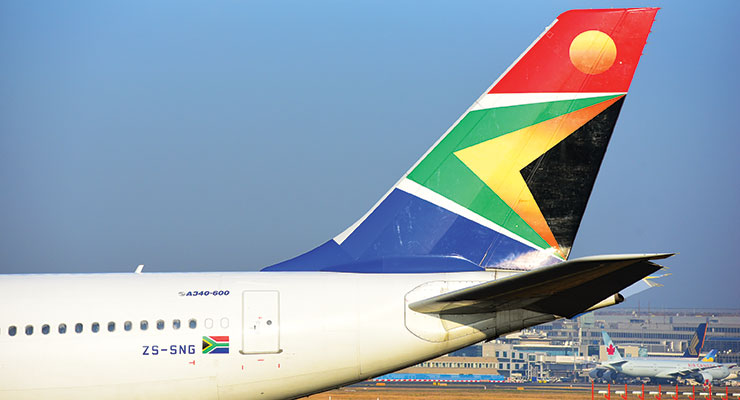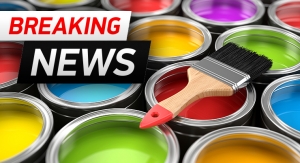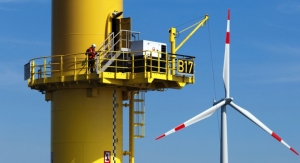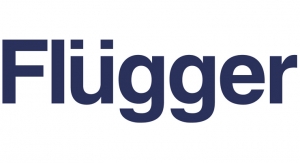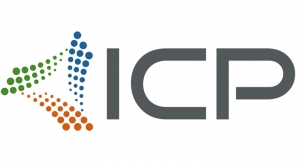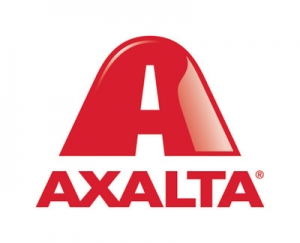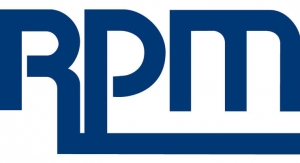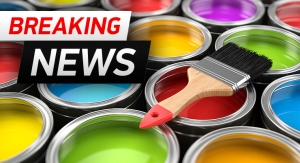Shem Oirere, Africa Correspondent05.12.21
The COVID-19 outbreak has caused far-reaching implications across the globe with the lockdowns, travel bans and business shutdowns continuing to disrupt entire industry supply chains and the aviation industry has not been spared.
The disruption has impacted the chemicals, materials and aviation sectors dimming previous predictions of booming aerospace coatings markets as businesses shut down and government’s imparts travel bans.
Latest aviation industry performance indicators for many African countries show grim numbers in terms of passengers and revenue earnings that impact the maintenance, repair and overhaul/operations and hence consumption of aerospace coatings targeting an aircraft’s interior and exterior applications.
This is true of countries such as South Africa where production of aircraft and complex aircraft systems as well as avionics and electronic warfare systems and UAV’s may have been slowed by the national lockdowns that shutdown most manufacturing facilities.
With the cessation of international flights, Africa’s top 10 aviation markets led by South Africa lost between them 33.4 million passengers in 2020 and a combined revenue loss of $7.06 billion according to the International Air Transport Association (IATA), a trade association of the world’s airlines.
The Association said “airlines in Africa are struggling for survival” as business and commercial operations ground to a halt as lockdowns took effect.
“Air Mauritius has entered voluntary administration, South African Airways and SA Express are in business rescue, other distressed carriers have placed staff on unpaid leave or signaled their intention to cut jobs and more airlines will follow if urgent financial relief is not provided,” it said.
The massive losses have since 2020 put at risk nearly two million jobs in Africa particularly manufacturing and those engaged in aircraft repairs and maintenance operations.
Add to this the manufacturers and suppliers of the coatings and associated materials.
“Airlines capacity for 2020 in Africa is expected to be down between 60 percent and 63 percent in comparison to originally planned levels (baseline),” said African Development Bank (AfDB) quoting an October 2020 report by International Civil Aviation Organization (ICAO), a specialized agency of the United Nations.
“This, consequently, means that for 2020 the African aviation sector will have lost around $15 billion ($8.6 billion for African registered airlines) in passenger revenue – without mentioning the devastating ramifications this loss may have in other sectors of the economy,” the bank added.
The bank said aircraft manufacturers such as Boeing and Airbus “have seen their aircraft orders sharply reduced and forced to go through restructuration processes and massive lay-offs.”
Some African firms such as Aerosud, South Africa’s largest private-sector aviation-industrial company with an annual turnover of approximately $70 million per annum, including supplying aircraft components to both Airbus and Boeing, have been impacted by the shutdowns and restrictions although the bank says the company “remains optimistic about its future as it was able to negotiate a very fair and reasonable cut-over plan with Boeing.”
AkzoNobel, a leading aerospace coatings producer said in its latest annual report the segment of its business “was heavily impacted due to an almost complete stop in air traffic.”
Globally, American Fortune 500 company and global supplier of paints, coatings, and specialty materials, PPG Industries, which is also one of the leading producers of aerospace coatings said in the last quarter of 2020 “sales volumes were down more than 30 percent, impacted by lower commercial OEM and aftermarket demand, while sales for aerospace military applications remained similar to the prior year.”
PPG has several branches in Africa.
Company chairman and CEO Michael H. McGarry, said overall, global coatings demand is likely to continue improving “in many of the end-use markets we serve and across all our major regions, and we expect overall global economic activity to strengthen in the first half of 2021.”
“However, due to increasing pandemic-related restrictions and certain supply chain disruptions, there is uncertainty regarding when [the] coatings demand growth will fully materialize,” he cautioned.
Meanwhile, some African governments have announced interventions such as economic stimulus packages that are expected to restart economies and keep afloat the airline industry, awaiting full recovery of the sector which supports 6.2 million jobs across the continent and contributes more than $56 billion to the combined GDP of the region.
According to Muhammad Al Bakri, IATA’s regional VP for Africa and the Middle East, “Restarting aviation and opening borders will be critical to the eventual economic recovery.”
Moves to resuscitate and nurse to recovery Africa’s aviation industry include those by Seychelles that waived all landing and parking fees for April to December 2020 and Cote d’Ivoire in West Africa that waived its Tourism Tax for transit passengers.
As for South Africa, the government deferring payroll, income and carbon taxes across all industries, which will also benefit airlines domiciled in that country as part of its economic support intervention.
However, OECD advises governments any intervention should not only focus on large player, but “should ensure that young firms and start-ups are included, for instance through complementary measures.”
“Failing to include young firms may lead to excessive consolidation by the largest players,” it said.
Furthermore, the African Development Bank proposes to Airport operators to cut down on planned infrastructure development to re-allocate the finances to priority areas.
“Airport expansion works are one of the most significant investments for airport operators and governments, and their opportunity during the current crisis should be re-evaluated, as most expansions will not be required for a long period,” the bank said.
Although any reduction in airport infrastructure development means less demand for coatings use, the bank said re-evaluation of expansion plans would enable airport operators to “use their cash to sustain their current operations and thus reconsider expansion plans in the future.”
Nevertheless, many African countries have now joined the rest of the world in the phased reopening of their airspace to commercial travel that increases the number of commercial aircraft in operation hence providing an opportunity for growth of demand in the supply of aerospace coatings.
The disruption has impacted the chemicals, materials and aviation sectors dimming previous predictions of booming aerospace coatings markets as businesses shut down and government’s imparts travel bans.
Latest aviation industry performance indicators for many African countries show grim numbers in terms of passengers and revenue earnings that impact the maintenance, repair and overhaul/operations and hence consumption of aerospace coatings targeting an aircraft’s interior and exterior applications.
This is true of countries such as South Africa where production of aircraft and complex aircraft systems as well as avionics and electronic warfare systems and UAV’s may have been slowed by the national lockdowns that shutdown most manufacturing facilities.
With the cessation of international flights, Africa’s top 10 aviation markets led by South Africa lost between them 33.4 million passengers in 2020 and a combined revenue loss of $7.06 billion according to the International Air Transport Association (IATA), a trade association of the world’s airlines.
The Association said “airlines in Africa are struggling for survival” as business and commercial operations ground to a halt as lockdowns took effect.
“Air Mauritius has entered voluntary administration, South African Airways and SA Express are in business rescue, other distressed carriers have placed staff on unpaid leave or signaled their intention to cut jobs and more airlines will follow if urgent financial relief is not provided,” it said.
The massive losses have since 2020 put at risk nearly two million jobs in Africa particularly manufacturing and those engaged in aircraft repairs and maintenance operations.
Add to this the manufacturers and suppliers of the coatings and associated materials.
“Airlines capacity for 2020 in Africa is expected to be down between 60 percent and 63 percent in comparison to originally planned levels (baseline),” said African Development Bank (AfDB) quoting an October 2020 report by International Civil Aviation Organization (ICAO), a specialized agency of the United Nations.
“This, consequently, means that for 2020 the African aviation sector will have lost around $15 billion ($8.6 billion for African registered airlines) in passenger revenue – without mentioning the devastating ramifications this loss may have in other sectors of the economy,” the bank added.
The bank said aircraft manufacturers such as Boeing and Airbus “have seen their aircraft orders sharply reduced and forced to go through restructuration processes and massive lay-offs.”
Some African firms such as Aerosud, South Africa’s largest private-sector aviation-industrial company with an annual turnover of approximately $70 million per annum, including supplying aircraft components to both Airbus and Boeing, have been impacted by the shutdowns and restrictions although the bank says the company “remains optimistic about its future as it was able to negotiate a very fair and reasonable cut-over plan with Boeing.”
AkzoNobel, a leading aerospace coatings producer said in its latest annual report the segment of its business “was heavily impacted due to an almost complete stop in air traffic.”
Globally, American Fortune 500 company and global supplier of paints, coatings, and specialty materials, PPG Industries, which is also one of the leading producers of aerospace coatings said in the last quarter of 2020 “sales volumes were down more than 30 percent, impacted by lower commercial OEM and aftermarket demand, while sales for aerospace military applications remained similar to the prior year.”
PPG has several branches in Africa.
Company chairman and CEO Michael H. McGarry, said overall, global coatings demand is likely to continue improving “in many of the end-use markets we serve and across all our major regions, and we expect overall global economic activity to strengthen in the first half of 2021.”
“However, due to increasing pandemic-related restrictions and certain supply chain disruptions, there is uncertainty regarding when [the] coatings demand growth will fully materialize,” he cautioned.
Meanwhile, some African governments have announced interventions such as economic stimulus packages that are expected to restart economies and keep afloat the airline industry, awaiting full recovery of the sector which supports 6.2 million jobs across the continent and contributes more than $56 billion to the combined GDP of the region.
According to Muhammad Al Bakri, IATA’s regional VP for Africa and the Middle East, “Restarting aviation and opening borders will be critical to the eventual economic recovery.”
Moves to resuscitate and nurse to recovery Africa’s aviation industry include those by Seychelles that waived all landing and parking fees for April to December 2020 and Cote d’Ivoire in West Africa that waived its Tourism Tax for transit passengers.
As for South Africa, the government deferring payroll, income and carbon taxes across all industries, which will also benefit airlines domiciled in that country as part of its economic support intervention.
However, OECD advises governments any intervention should not only focus on large player, but “should ensure that young firms and start-ups are included, for instance through complementary measures.”
“Failing to include young firms may lead to excessive consolidation by the largest players,” it said.
Furthermore, the African Development Bank proposes to Airport operators to cut down on planned infrastructure development to re-allocate the finances to priority areas.
“Airport expansion works are one of the most significant investments for airport operators and governments, and their opportunity during the current crisis should be re-evaluated, as most expansions will not be required for a long period,” the bank said.
Although any reduction in airport infrastructure development means less demand for coatings use, the bank said re-evaluation of expansion plans would enable airport operators to “use their cash to sustain their current operations and thus reconsider expansion plans in the future.”
Nevertheless, many African countries have now joined the rest of the world in the phased reopening of their airspace to commercial travel that increases the number of commercial aircraft in operation hence providing an opportunity for growth of demand in the supply of aerospace coatings.

